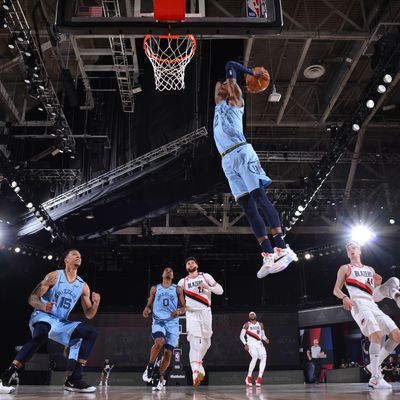
The phrase “stick to sports” — hurled at athletes and commentators by people who mistakenly believe it’s possible to separate politics and athletic pursuits — has been thoroughly vivisected over the years, and with good reason. But I confess that I’ve always been sympathetic to the theoretical concept. A large part of the public utility of sports, I’d argue, is that it’s one of the few worlds you can escape into as refuge from your troubles, a bona fide “safe space” that isn’t actually free of the failings of the society that surrounds it but can still be intricately constructed to make you feel like it is. I covered the 2016 Republican National Convention in Cleveland and was there for Trump’s thundering, terrifying “Only I Can Fix It!” speech. I spent the flight home staggered, mortified, desperate for something to take my mind off what I’d just witnessed. I found distraction in a baseball game — three hours where I could make all the hate go away for a while and simply be happy if my team won, or sad if it lost. The world was still there when the game was over, and so was Trump. But that made the three hours more valuable, not less. I don’t think you can ever separate sports and politics. But I understand why people try.
One of the most fascinating aspects of the first week of major professional sports in the United States — Major League Baseball, the NBA, and the WNBA all have commenced play in the last ten days — is how off watching these games has felt. Partly this is because of the unprecedented on-field circumstances, of course: no fans in the stands, players wearing masks, pumped-in crowd noise, the general sloppiness of the games themselves (completely reasonable when you consider how long these players have been idle).
But the strangeness goes beyond just the backdrop. These games, in leagues that are scrambling to keep their players healthy and their games on schedule without an outbreak that will derail the whole enterprise — as is threatening to happen in baseball — feel as perilous as everything else does right now, and increasingly fragile. So fragile, in fact, that it’s difficult to get emotionally involved at all. Is LeBron James going to win another title? Are the Mets going to make the playoffs? Can Sue Bird get a career-capping championship? I mean, forgive this guy who has made an entire career of writing long-winded dissertations about all of these narratives, but … who cares? Seriously: Who the hell cares?
This is an oddly nihilistic way to look at the situation, and I should probably entertain the possibility that I’m just reacting to the fact that my favorite baseball team has been in quarantine for the last week. But the utter lack of stakes is what has struck me the most watching sports come back. The usual ebb and flow, the anticipation, the drama, the manufactured gravitas of sports — it all feels woefully insufficient to the moment at hand. In a press conference before his team’s game against Memphis last weekend, San Antonio Spurs coach Gregg Popovich was asked whether injured forward Marco Belinelli would be available to play. This is how he responded:
If you are fortunate enough to be employed right now, it is difficult to focus on some of your job’s more banal aspects: Who wants to file expense reports at the end of the world? The same dynamic extends to professional sports. It’s evident from the unusually high number of mental mistakes committed during play that athletes are taking pride in their work but perhaps not passion in it. This, plus all the other unfamiliar factors, makes the experience of watching sports curiously antiseptic; it feels like the teams are keeping score more out of tradition than any sort of urgency. And the old simple equation of win equals happy and loss equals sad has been eradicated. The response to any result is still “We’re in the midst of a horrible pandemic that is exposing the rotten foundation of a once-proud and vibrant nation.” So, yeah: Forgive me if I can’t get too fired up about the Rangers’ loss to the Hurricanes. Sports aren’t serving as a distraction from the world at this point. They’re just not powerful enough to do that right now. I’m not sure anything could be.
What’s interesting, though, is that this dissonance has actually helped put sports into perspective in a way that is probably long overdue. Why were we getting so fired up about Tom Brady, anyway? Why have we been spending all this time yelling at each other about sign-stealing or inflated footballs? Surely all our territorial battles and regional turf wars will all return at some point, but with no fans in the stands, and with players less concerned about division rivals than making sure they maintain their social distance from the first baseman, they all feel rather silly right now. Sports have become less about the story lines and Instagram dramas and more about the competition and the joy of watching incredible athletes perform incredible athletic feats. The whole thing is less exciting, more bloodless. But it feels purer somehow. Paradoxically, a season feels smaller but each individual game — the act of watching a sporting event that, like everything else, could be taken away from you at any moment — feels more important. You appreciate the fact that you get to watch a game more, even while you know the sport itself matters less.
This is strange and disorienting and also might just be classified as progress. I don’t even know if Major League Baseball is going to finish its season, and if it does, it’s going to be a Frankenstein’s monster of a dog’s breakfast. The WNBA and the NBA and NHL playoffs, played in a bubble, have a nonstandard asterisk feel to them as well. But that’s okay. None of this adds up to anything larger anyway. If I may borrow from another idea of entertainment, it’s like watching a procedural television program rather than a serial one. Each game is a self-contained show, and it doesn’t matter if it connects to the larger narrative. It’s just a few hours of something else. The sports industrial complex has become so massive and unwieldy that it is in danger of spiraling out of control; witness the existential implosion going on in college football right now. But these are still just games after all: adults playing children’s games, running around wearing pajamas. Not taking them so seriously allows them to be what they were meant to be in the first place: a balm — temporarily calming but not meant to have any lasting prescriptive value.
This has all made sports less important but more valuable. I have taken to listening to baseball and basketball games on the radio, where it’s easier not to focus on the lack of fans and all the peculiarities of athletics in a pandemic. From far away, for a couple of hours, I can passively follow along without being too invested, a cool breeze rather than hot air. I have found it soothing in a time when little else is able to do the trick. And that’s what sports are supposed to be: Background noise to the world, not the center of it, a mild narcoleptic, just a bit to take the edge off … and right now, we really, really need the edge taken off. Sports have never meant less than they do right now, and it might just be making me love them more. Sports are finally what they were meant to be: not much at all. What a relief.






























